For example, Russian-language work announcements – or job postings – became three times less frequent, comprising only 13% of all announcements in 2022. The Ukrainian language made for 84% of all announcements. Similar trends occurred in daily speaking preferences.
The Russian-speaking minority in Ukraine was nearly 37% in 2012, 26% in 2021, and declined sharply to 13-15% in 2022, depending on poll results. Putin used the presence of a numerous Russian-speaking minority in Ukraine as his main argument about Ukraine’s close relation to Russia.
However, it is essential to note that Russian-speaking Ukrainians did not necessarily identify themselves with Russia politically even before the invasion, which explains the unity of all Ukrainians in repelling Russian aggression. After the invasion, even the cultural presence of the Russian language in Ukraine is becoming obsolete. This sign of former adherence of Ukraine to the Russian Empire and the USSR is rapidly vanishing.
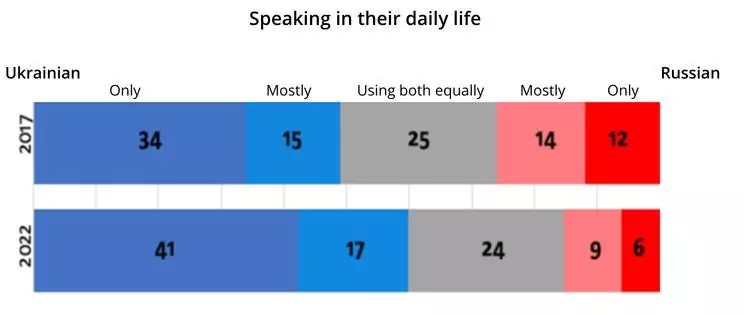
Ukrainian becomes the language of business
The Ukrainian language was the language of culture in Ukraine by the late 1990s. However, Russian dominated the business environment after the dissolution of the USSR. The Russian 2022 invasion prompted businesses to switch to Ukrainian en masse.
According to the analysts of work.ua – the main Ukrainian website for vacancy announcements – Russian language use by businesses declined threefold during 2022. As of October 2022, employers posted 84% of vacancies in Ukrainian and only 13% in Russian.
The change is dramatic, given that eight years before, the situation was reverse: Ukrainian was used in 16%, and Russian in almost 80% of announcements.
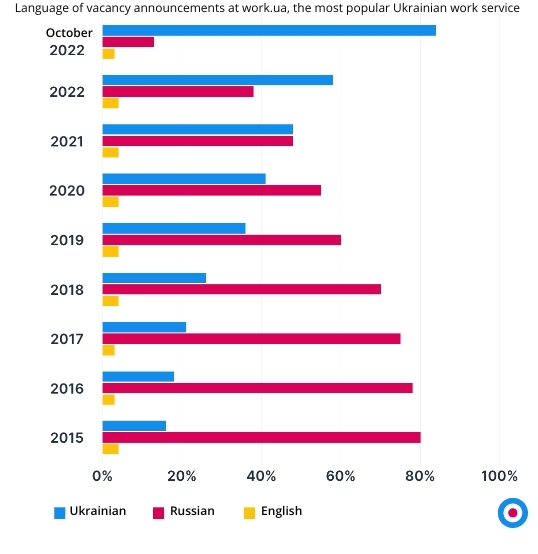
Regarding the regions, Lviv was and remains the most Ukrainophonic. 97% of vacancies in the city are posted in Ukrainian. The capital Kyiv has also shown a strong tendency towards Ukrainian, with 84% of vacancies posted in Ukrainian. The traditionally Russophonic Dnipro, Kharkiv, and Odesa have a higher share of Russian-language announcements, although the tendency is that they are also shifting to Ukrainian. More than 60% of vacancies in these cities are posted in Ukrainian.
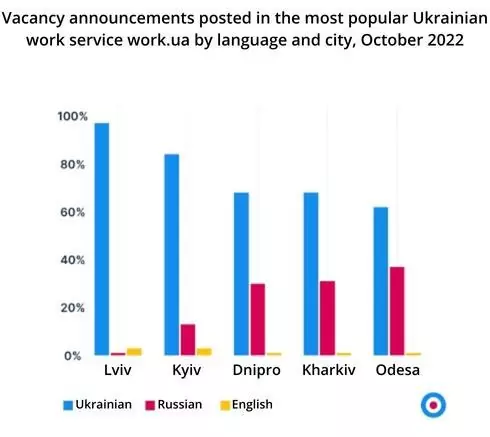
Most often, the Ukrainian language is used by younger people aged 16 to 25, while Russian is stronger among older generations educated under the Soviet regime.
Sociological polls confirm the job announcement insights
Sociologists noted the tendency to switch to Ukrainian in September 2022. Fresh data confirms it. The Kyiv International Institute of Sociology conducted a poll from 4 December to 27 December 2022. They found that the share of people mainly using Ukrainian “in daily life” in Ukraine rose from 49% to 58%, while Russian speakers declined from 26% to 15%, compared to 2017. Meanwhile, 24% said they were using both languages.
Even more favorable for the Ukrainian language was the higher share of those speaking Ukrainian at home and at work – 62% at home and 68% at work – compared to 15% speaking Russian at home and 11% at work.
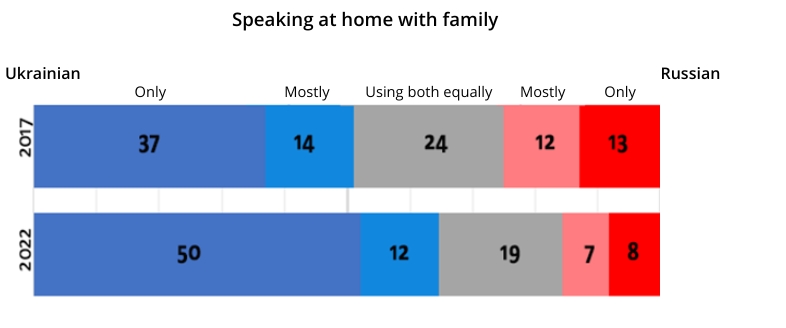
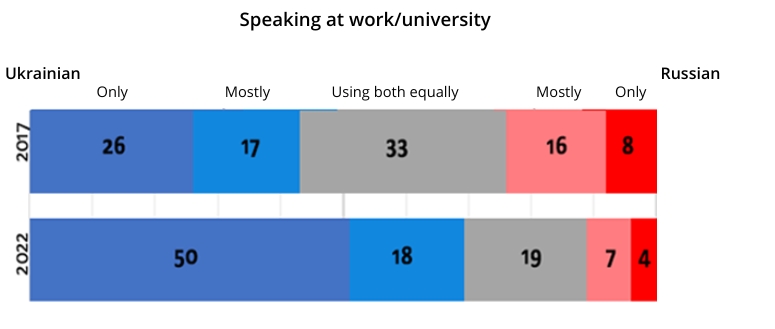
Especially important is the dynamic in regions of the Russophonic south-eastern half of Ukraine, which Russia attempted to occupy at the start of the war. For the first time, people using Ukrainian in their daily life outweighed those using Russian in those regions. Contrary to Putin’s calculation, people in the most Russified part of Ukraine rejected his troops and largely renounced the use of the Russian language in favor of Ukrainian, as a manifestation of their identity during the war.
Independent verification of what language people really speak in Ukraine confirms polling results
But maybe the results of the poll are merely wishful thinking and a political statement against the Russian invasion, while in everyday life Russophonic Ukrainians still speak Russian, their customary language? While this phenomenon can explain a small percentage of the shift, the tendency towards Ukrainization is much more profound, sociologist Volodymyr Kulyk contends.
He notes that a proxy indicator for what language people really prefer to speak is the language that they select for the interview.
In the 1990s, when sociologists used this method for the first time, 55% of Ukrainian citizens chose Russian as the language for the interview, while 45% chose Ukrainian – an obvious consequence of the Soviet policy of Russification.
In 2022, the balance changed: 87% of the respondents chose Ukrainian. The balance was high in favor of Ukrainian -- 74% -- even in Russophonic south and east.
“Moreover, even among those respondents who admitted that they speak only or mostly Russian in everyday life, 28% made an effort and chose to speak Ukrainian during the interview, and another 21% spoke both languages,” sociologist Volodymyr Kulyk, who worked on the questionnaire, notes.
This indicates that the Ukrainian language has become not only the language of culture and the language of the state but also a language of prestige.
“In more or less formal communication (even by phone), the vast majority already understand the need to speak Ukrainian. And this is the biggest and most important change in the language situation, which, I assume, was caused primarily by Russian bloody aggression,” Kulyk further notes.
Other indicators confirming the shift toward speaking Ukrainian
The Ukrainian language is more frequently used by young people, while Russian remains most frequently used among older generations or those with a low income. Notably, for the first time, more people speak Ukrainian at work than at home.
“Work has finally ceased to be a place where Ukrainian-speaking people were forced to speak Russian in whole or in part, satisfying the wishes of managers and clients, or inertial ideas about how to speak,” Kulyk writes, explaining that Soviet culture of the Russian language as the lingua franca spoken at work is no more relevant for Ukraine.
The strong shift towards Ukrainian was also noted among internet users. The share of those using Ukrainian exclusively or most frequently rose to 52%, while those using Russian declined to a mere 6%. Still, 38% are using both languages on the internet.
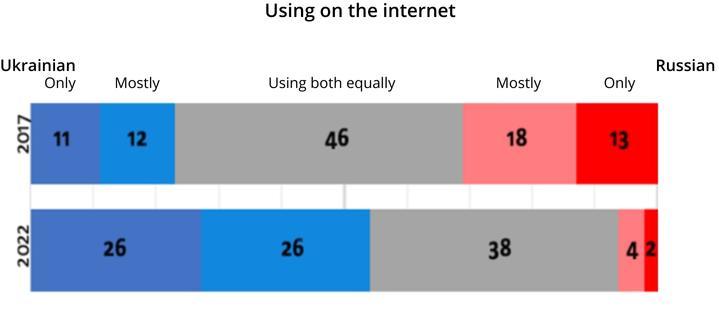
There is strong consensus among Ukrainians on how the use of language should evolve in the country. 80% say the Ukrainian language should be dominant in all spheres of communication, refuting Putin’s claims about the alleged Russian solid majority in Ukraine (or its regions) who want unity with Russia.

People not familiar with the context of the Ukrainian nation may consider it strange why the language issue is so crucial for Ukraine. In effect, language is an instrument of security and historical justice. Before the 1930s, the Ukrainian language was dominant in all contemporary Ukrainian regions and even spoken by the majority in some southwest parts of contemporary Russia, like Kuban or Belgorod. The Russian Empire in the 19th century, followed by the USSR, exiled and executed Ukrainian writers and intellectuals, starved 4 million Ukrainians in the Stalin-manufactured Holodomor famine, and imposed the official status of the Russian language in Ukraine – all to make people speak Russian instead of Ukrainian and to assimilate them into the Russian world. Ukraine still felt these post-colonial traces after its independence in 1991, as reflected in the 2001 census: 78% of people living in Ukraine considered themselves Ukrainian by ethnicity; 67.5% considered Ukrainian their mother tongue; only 44% spoke solely Ukrainian at home; and 15% spoke both Ukrainian and Russian. This inconsistency emerged due to Russified Ukrainians. Pressured by the official policies of the Russian Empire and, afterward, the USSR, they tried to pass as Russians for career prospects but did not lose their Ukrainian roots. Share of citizens for whom Ukrainian is the native language, according to the 2001 census In the 2000s and 2010s, Russia used language as a foreign policy tool, claiming that those regions where people speak Russian should belong to Russia. Yet, after the USSR ceased to exist, people gradually returned to the Ukrainian language even without an active state policy. As late as 2014, after the Euromaidan Revolution, the Ukrainian state started a soft policy of Ukrainization, requesting state officials to use Ukrainian, establishing radio and TV quotas for Ukrainian music, as well as making Ukrainian compulsory at schools (with the option of studying minority languages in parallel, upon the request of parents). The 2019 language law established Ukrainian as the default language of services in Ukraine unless a customer requested another language. All these measures in no way prohibited the use of Russian or other languages. The new legislation was intended to eliminate post-colonial traces that implied the priority of Russian, when Ukrainian speakers would be answered in Russian in stores, state offices, or hospitals in their home country – a practice once common but now rare. Read also: A short guide to the linguicide of the Ukrainian language | Infographics 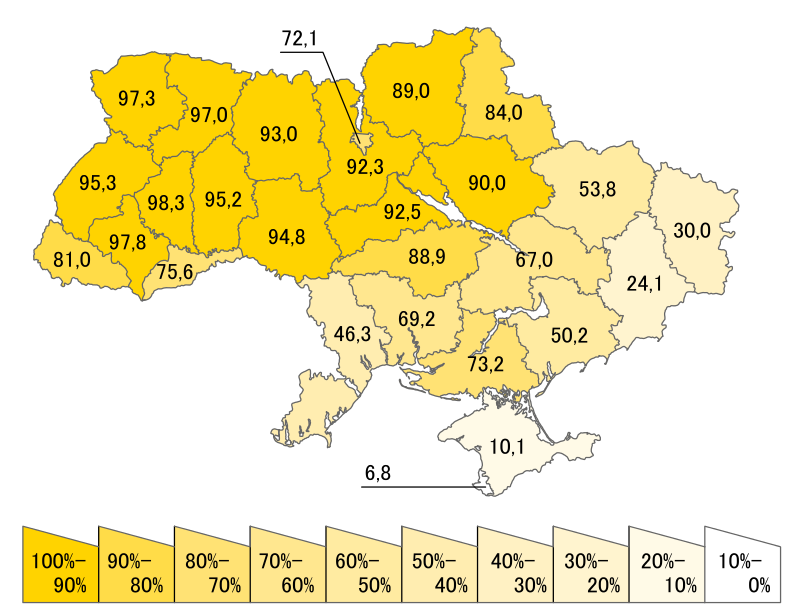
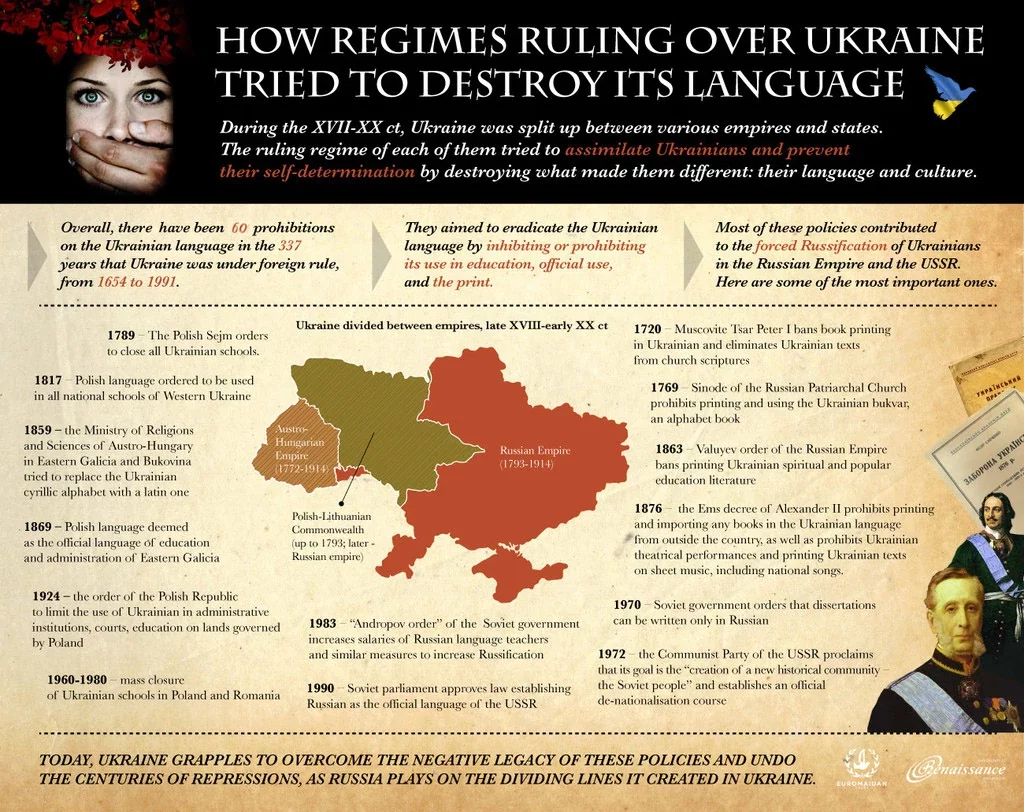
Related:

